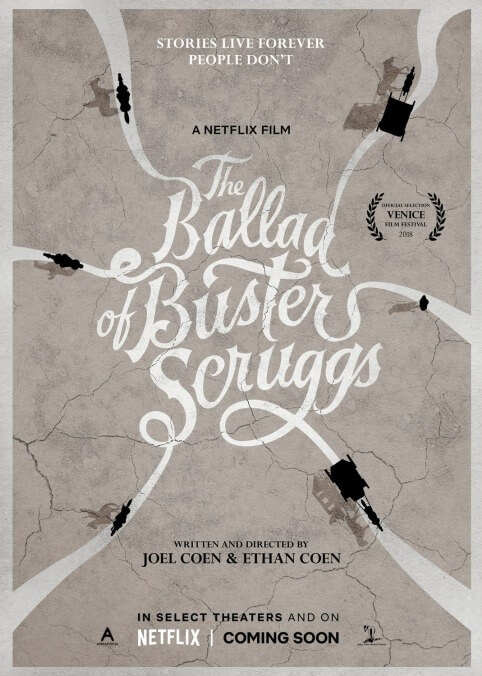The Old West is Coen country. Senselessly brutal and rich with rapscallions, it’s a backlot backdrop perfectly suited to the preoccupations of these sibling movie brats. Yet for all the ways the genre has crept into their catalog—a sagely cowboy narrator, an oater-within-the-film, sprawling frontiers of the Depression-era South and 1980s Texas—Joel and Ethan have only once officially dabbled in the premier blockbuster form of classic Hollywood, with their mostly irony-free remake of True Grit. Before now, that is. As if making up for lost time, their new Netflix anthology film The Ballad Of Buster Scruggs offers six Coen horse operas for the price of one. They run a gamut of conventions, proving just how much landscape—geographic and narrative—the Western really covers. What they all convey, some more comically than others, is how short and pitiless life could be in this heavily mythologized era.
It’s a truly deranged few minutes, this miniature vaudeville musical of screwball carnage. Daftly subverting the bloodless fun of old-school gunslinger fare, the Coens make the violence at once hilarious and uncomfortably grotesque: Our “hero” creatively dispatches one rough customer in a way that recalls the outrageous slapstick of one-time collaborator Sam Raimi, before leading the whole saloon in a perverse sing-along, all while the deceased’s bereaved brother wails over the grisly aftermath. Buster is like Anton Chigurh by way of the Road Runner, dealing death to simpletons until the Coens remind him (and us) that he’s as human as his marks. (There’s a “look at that fucking bone” moment here, too.) He’s also, quite possibly, a proxy for the filmmakers—standing both within and outside of the action, having his winking, wiseass fun with the caricatures around him. In a sly nod to the Coens’ own reputation, Buster breaks the fourth wall to dispute the nickname, “The Misanthrope,” splashed across his wanted poster. Like his creators, he kills people, and sometimes gleefully, but does that mean he hates them?
A whole movie in this gory-goofball mode would be exhausting, and probably unsustainable. So Buster Scruggs constantly switches up the tone along with the subgenre. In another darkly comic vignette, James Franco plays a bank robber who gets in way over his head—an episode that builds to the movie’s best punchline, an inspired bit of actual gallows humor. Things get darker, figuratively and literally, in “Meal Ticket,” starring Liam Neeson as an impresario going town to increasingly indifferent town with an unusual star attraction (Harry Melling), the reception getting as chilly as the wintry weather; the Coens play shrewdly on the audience’s relationship to Neeson’s signature nobility, right up to an ending that belatedly reveals where his priorities truly lie. The best of the stories may also be the longest and most humane: “The Gal Who Got Rattled,” which puts Meek’s Cutoff traveler Zoe Kazan back on the Oregon Trail, casting her as a lonely spinster who finds potential romance with the rugged guide (Bill Heck) of a covered-wagon expedition. Given some extra room to breath, the Coens hang mysteries and open questions on the sparse story, from the significance of a stubbornly surviving dog to how the concealed, unspoken feelings of an aging caravaneer (Grainger Hines) may in some way be responsible for the segment’s sobering conclusion.
If its entries vary in quality, The Ballad Of Buster Scruggs is still relatively consistent, or at least coherent, for an omnibus project. Part of that is the Coens’ craftsmanship, reliably precise as Buster’s aim; no wonder Netflix is getting this thing into theaters a week before it’s streaming—the starkly striking cinematography by Bruno Delbonnel demands to be seen on a big screen, if possible. Just about every segment has at least one remarkable moment, playing with perspective or duration: an outlaw surreally inspecting a bullet that’s critically passed through both sides of his ten-gallon hat; a lone cowboy fending off waves of enemy marauders; the small eternity of suspense that follows an ambush, as the guilty party waits to see if his victim is really down for the count. Ever the whip-smart film-history students, the Coens also pay explicit tribute to genre touchstones. The Franco installment, for example, contains a direct homage to the creaky, loud-as-hell sound design of the famous opening scene of Once Upon A Time In The West. And the closing tale is basically their crooked, existentially ominous variation on Stagecoach, with Brendan Gleeson, Tyne Daly, Saul Rubinek, Chelcie Ross, and Jonjo O’Neill as strangers sharing an antagonistic ride to a lodge.
It’s telling, in some way, that the episode with the most conventional sense of closure is the one the Coens didn’t dream up entirely themselves: It’s based, however loosely, on a Jack London short story, with Tom Waits as a gold prospector whose innovative process brings to mind another recent, eccentric Western, The Sisters Brothers. For the most part, these stories resist “satisfying” resolution. Like No Country For Old Men, the film presents anticlimax as a philosophical position. Overarching genre aside, the format recalls nothing so much as Tales From The Crypt, down to transitional cutaways to a leather-bound book, featuring illustrations that tease events from the pocket-sized dramas to come. But Crypt’s stories unfold in an essentially moral universe, punishing sinners via an almost Old Testament karmic retribution. What goes around doesn’t necessarily come around in The Ballad Of Buster Scruggs, whose true unifying factor is the Coens’ increasingly withering worldview, their conception of the universe as essentially uncaring. In that way, the Western may offer them everything they want out of a genre sandbox: thrills, plenty of oddballs, and an environment too unforgiving to fall under any god’s jurisdiction.
Note: This is an expanded version of the review The A.V. Club
ran from the New York Film Festival.









![HBO teases new Euphoria, Larry David, and much more in 2026 sizzle reel [Updated]](https://img.pastemagazine.com/wp-content/avuploads/2025/12/12100344/MixCollage-12-Dec-2025-09-56-AM-9137.jpg)































